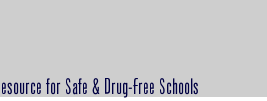 |
 |
|
|
|
||
|
|
||
 |
 |
|
Study in public schools reveals PeaceMakers' curriculum significantly reduces "high risk" student violenceIn a study completed May, 2001 in 14 Missouri public schools served by FreeWay, violent behavior was reduced 13.5% by the teaching of the "PeaceMakers'" violence prevention curriculum in 61 classrooms. The survey of a total of 957 students, grades 3 through 12, was designed to measure the changes brought about by the 4-session classroom activities taught by FreeWay prevention specialists.The anonymous survey was conducted prior to the first classroom session and then re-administered following the fourth classroom session. (Usually the FreeWay educator spends one day on each school campus about once a month.) This "pre" and "post" questionnaire was designed to measure student attitudes, verbal abuse, and physical abuse patterns. Students were instructed to indicate their grade and gender, then respond to these three statements:
For each of these three statements, students were asked to check the one best answer: "Most of the time"; "About half of the time"; or "Hardly ever." The students who marked "Most of the time" on the survey were considered to be "high risk," and they are the main focus of the inter-active activities included in the K-12 curriculum. (Although PeaceMakers' is taught in all grades, the survey did not include children in kindergarten thru second grades.) Overall results (grades 3-12) reveal that PeaceMaker reduced "Holding grudges/seeking revenge" among high risk students by 17.7%. Verbal abuse was reduced by 24.4%, and physical abuse was reduced by 13.5% among those students who initially indicated "Most of the time" to the survey questions before the four teaching sessions began. Among the high risk elementary students (grades 3-5), the most significant change occurred in their attitudes, with a 31.7% reduction in the number of those who initially reported holding grudges and seeking revenge "Most of the time." Among the high risk middle school students (grades 6-8), the number of students using verbal abuse "Most of the time" dropped 35.1%, and the number of students using physical abuse "Most of the time" dropped 41.2%. Among the high risk high school students (grades 9-12), the number of students holding grudges and seeking revenge "Most of the time" fell 38.2%; the number of students using verbal abuse "Most of the time" plummeted 47.0%; and the number of students using physical abuse "Most of the time" dropped 6.7%. The 3-volume PeaceMakers' curriculum, written by Dr. Curt Scarborough, former president of FreeWay, is based on the concept that violence begins with attitudes of the mind, progresses through angry speech, and results in hostile actions. Therefore, students are taught always to speak courteously and treat others politely, with acceptance, dignity, and respect . . . the same way they would like to be spoken to and treated. The curriculum is grounded on two of the main pillars of our nation: liberty and justice . . . as seen in the pledge of allegiance to the flag. These are the values we teach in public school classrooms: first, "liberty" . . . that a person is free to do whatever he decides within the bounds that a unit of society (home, school, state, etc.) has established. Our second value is "justice" . . . which we define as the boundaries which have been established, limiting our personal freedom on the basis of truth, fairness, right, and benefit to all concerned. Persons who step on these lines are "out of bounds." They make themselves subject to a penalty designed to fit the seriousness of the infraction. PeaceMakers' uses fresh lesson plans and challenging learning activities to teach three fundamental principles:
|
| To place orders directly or for more information call toll-free: 1-888-7FREEWAY |
Copyright © 2002-2007 • The FreeWay • St. Louis, Missouri